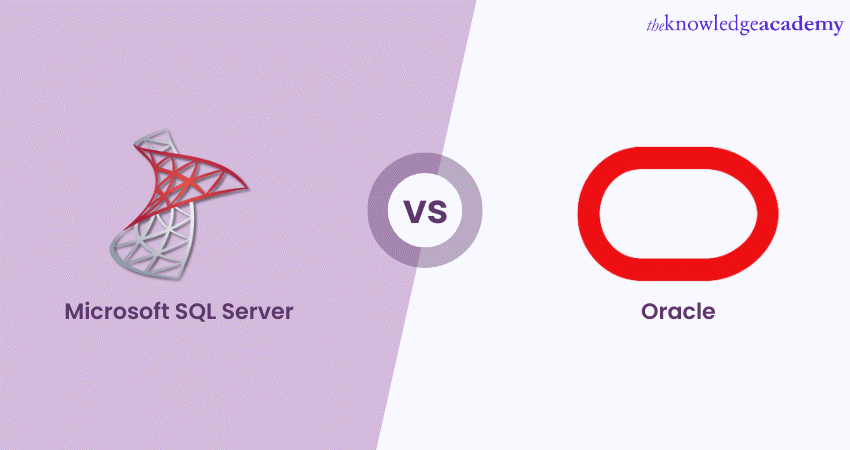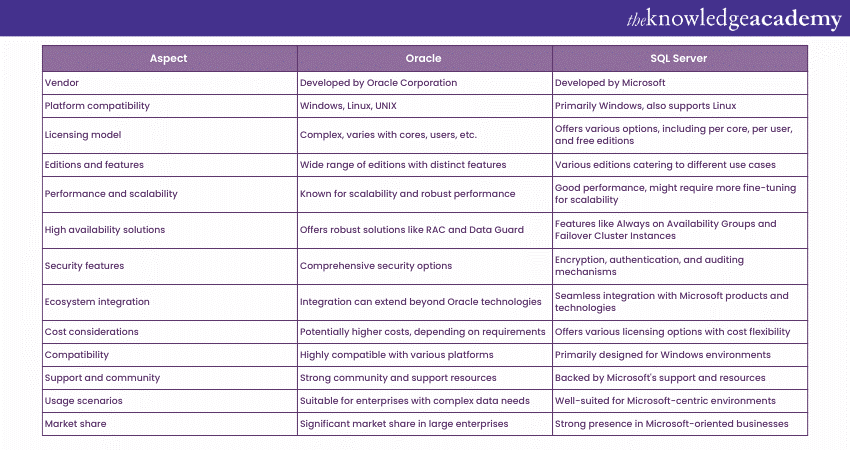We may not have the course you’re looking for. If you enquire or give us a call on +44 1344 203 999 and speak to our training experts, we may still be able to help with your training requirements.
Training Outcomes Within Your Budget!
We ensure quality, budget-alignment, and timely delivery by our expert instructors.

When it comes to managing and storing data, databases play a pivotal role in modern information technology. Among the multitude of Database Management Systems available, two prominent players stand out: Oracle and SQL Server. Both are powerful tools, but they cater to different needs and have unique features.
According to Oracle Base, Oracle has approximately 70 million users, processes over 33 billion transactions daily, and stores more than 700 petabytes of data. In this blog, we will explore the key differences between Oracle and SQL Server, offering a detailed comparison to help you make the best choice for your organisation.
Table of Contents
1) What is Oracle Database?
2) What is SQL Database?
3) Key Differences Between Oracle and SQL
a) Vendor
b) Platform Compatibility
c) Licensing Model
d) Editions and Features
e) Performance and Scalability
f) High Availability Solutions
g) Security Features
h) Ecosystem Integration
4) Conclusion
What is Oracle Database?
Oracle Database is a system designed to store and manage large amounts of data for businesses. Known for its reliability, it helps companies organise information so it can be easily accessed and used. Oracle is trusted by many large corporations worldwide due to its robust security features and scalability, ensuring data is safe and retrievable whenever needed.
What is SQL Database?
An SQL Database uses Structured Query Language (SQL) to manage and organise data. It allows users to perform tasks such as adding, updating, and retrieving information with simple commands. SQL is widely used in many database systems, including Oracle and Microsoft SQL Server, and is a common method for storing and managing data in tables.
Key Differences Between Oracle and SQL
Understanding the differences between Oracle and SQL Server involves more than just technical features. It’s about evaluating compatibility, performance, licensing, and how well they align with your organisation’s goals.

a) Vendor
The distinction in "vendor" between Oracle and SQL Server holds significant implications. Oracle, developed by Oracle Corporation, stands as a symbol of innovation and leadership amongst databases and offers reassurance to enterprises seeking a reliable partner. On the other hand, SQL Server, born under Microsoft's umbrella, benefits from seamless integration with the Microsoft ecosystem. This integration extends beyond databases, influencing decisions related to operating systems, productivity tools, and cloud services. Choosing between these vendors means considering not just technical features, but also the overarching compatibility and strategic advantages that come with the respective vendor's offerings.
b) Platform Compatibility
"Platform Compatibility" refers to the ability of a database management system to run on different operating systems seamlessly. Oracle demonstrates versatility in this aspect, functioning efficiently across Windows, Linux, and UNIX platforms. This flexibility grants businesses the freedom to choose the operating system that best suits their infrastructure. On the other hand, while SQL was initially tailored for Windows environments, it has expanded its support to include Linux as well. This difference in compatibility impacts the adaptability of the database system to diverse technological landscapes, enabling businesses to optimally align their database solution with their existing infrastructure and preferences.
Empower yourself with our comprehensive SQL Courses – Acquire the essential skills to manipulate data and command databases with confidence!
c) Licensing Model
The licensing model for Oracle and SQL Server diverges significantly, impacting cost considerations for businesses. Oracle's licensing can be intricate, with costs dependent on factors like processor cores, users, and features. This complexity can pose challenges for budgeting and scalability. In contrast, SQL Server offers a range of licensing options, including per core and per user, offering more flexibility. Moreover, SQL Server provides free editions for limited usage scenarios, accommodating smaller businesses. These contrasting approaches to licensing should be carefully weighed, as they can greatly influence the overall financial implications of adopting either Oracle or SQL Server for database management.
d) Editions and Features
Both Oracle and SQL Server offer a diverse range of editions, each tailored to specific user needs. Oracle presents a comprehensive spectrum of editions, from the standard Oracle Database Standard Edition to the high-end Oracle Database Enterprise Edition, each equipped with a distinct set of features. SQL Server similarly offers editions like the free SQL Server Express, the versatile SQL Server Standard, and the advanced SQL Server Enterprise, catering to various business scales. These editions dictate factors such as scalability, performance enhancements, and advanced analytics capabilities, allowing businesses to select a SQL Database solution that precisely aligns with their operational requirements.
Learn the basics of SQL with our Introduction to SQL Training – Join today!
e) Performance and Scalability
Performance and scalability are critical factors when choosing between Oracle and SQL Server. Oracle's reputation for scalability makes it a preferred choice for enterprises dealing with extensive data volumes and high transaction rates. Its architecture and caching mechanisms contribute to robust performance. While SQL Server offers good performance, Oracle's multi-threading and caching provide an edge in handling large workloads. However, fine-tuning SQL Server can bridge the scalability gap. Assessing the precise data needs and growth projections of your organisation is essential to determine whether Oracle's inherent scalability or SQL Server's adaptable performance suits your database demands best.
f) High Availability Solutions
High availability solutions are critical components of database management systems, ensuring uninterrupted access to data and minimal downtime. Oracle and SQL Server offer distinct mechanisms to achieve this. Oracle's robust offerings include Real Application Clusters (RAC), which enables seamless distribution of data across multiple nodes for load balancing and failover. Data Guard provides data protection and disaster recovery. Similarly, SQL Server boasts Always on Availability Groups, facilitating automatic failover and synchronisation between databases. Both systems prioritise data availability, but Oracle's mature solutions cater well to extensive enterprise demands, while SQL Server excels in Microsoft-centric environments.
g) Security Features
Both Oracle and SQL Server are dedicated to safeguarding data integrity and confidentiality through robust security features. Oracle offers a wide array of security mechanisms, including data encryption, fine-grained access control, and advanced auditing. Notably, Oracle's Advanced Security option enhances protection through transparent data encryption, securing sensitive information both at rest and in transit. SQL Server, on the other hand, boasts integrated security with Windows authentication, role-based access control, and dynamic data masking. Its close integration with Active Directory ensures seamless user management and authentication.
Learn to create a database with our Introduction to MySQL Course – Join today!
h) Ecosystem Integration
Ecosystem integration refers to how seamlessly a database management system aligns with a broader technological environment. SQL Server excels in this aspect, fostering effortless integration with a range of Microsoft products, including Azure cloud services, Power BI analytics, and SharePoint collaboration tools. This cohesive integration streamlines workflows, enhances data accessibility, and capitalises on the familiarity of Microsoft solutions.
In contrast, Oracle's integration extends beyond its proprietary offerings, potentially requiring more effort to harmonise with non-Oracle technologies, making SQL Server a preferable choice for organisations deeply embedded in the Microsoft ecosystem.
Conclusion
Both Oracle Server and SQL Server offer robust solutions for data management, but they cater to different needs. The "Difference Between Oracle and SQL Server" lies in their scalability and comprehensive feature set, while SQL Server is ideal for businesses looking for a cost-effective, user-friendly solution that integrates with Microsoft products. The right choice depends on your organisation’s size, requirements, and existing technology stack.
Learn how to create tables in SQL with our Advanced SQL Training – Join today!
Frequently Asked Questions

Both Oracle and SQL Server are powerful options for enterprise applications. The choice is based on your needs, budget, and system requirements.

Yes, database migration from SQL Server to Oracle is possible using available tools and services.

The Knowledge Academy takes global learning to new heights, offering over 30,000 online courses across 490+ locations in 220 countries. This expansive reach ensures accessibility and convenience for learners worldwide.
Alongside our diverse Online Course Catalogue, encompassing 19 major categories, we go the extra mile by providing a plethora of free educational Online Resources like News updates, Blogs, videos, webinars, and interview questions. Tailoring learning experiences further, professionals can maximise value with customisable Course Bundles of TKA.

The Knowledge Academy’s Knowledge Pass, a prepaid voucher, adds another layer of flexibility, allowing course bookings over a 12-month period. Join us on a journey where education knows no bounds.

The Knowledge Academy offers various SQL Courses, including the Introduction to SQL Course, Advanced SQL, and Introduction to MySQL Course. These courses cater to different skill levels, providing comprehensive insights into Top SQL Books.
Our Programming & DevOps Blogs cover a range of topics related to SQL, offering valuable resources, best practices, and industry insights. Whether you are a beginner or looking to advance your SQL skills, The Knowledge Academy's diverse courses and informative blogs have got you covered.
Upcoming Programming & DevOps Resources Batches & Dates
Date
 Oracle SQL Fundamentals
Oracle SQL Fundamentals
Mon 6th Jan 2025
Mon 17th Mar 2025
Mon 12th May 2025
Mon 7th Jul 2025
Mon 15th Sep 2025
Mon 3rd Nov 2025
Mon 15th Dec 2025







 Top Rated Course
Top Rated Course



 If you wish to make any changes to your course, please
If you wish to make any changes to your course, please


